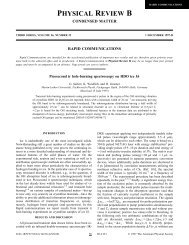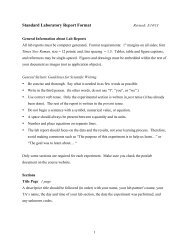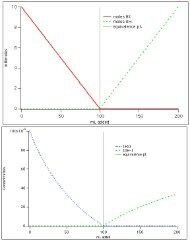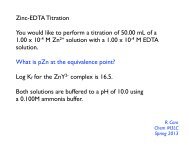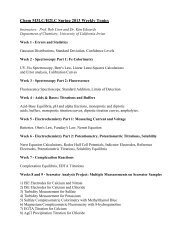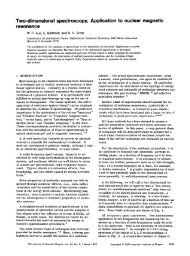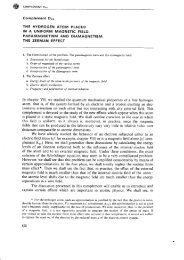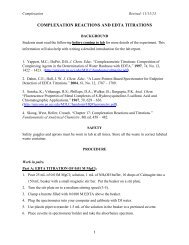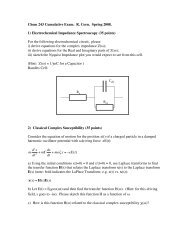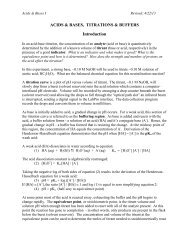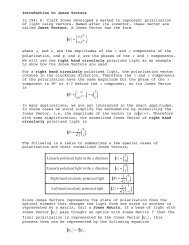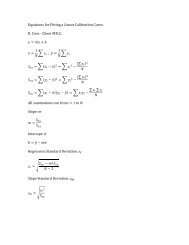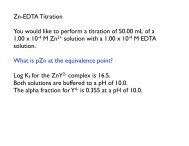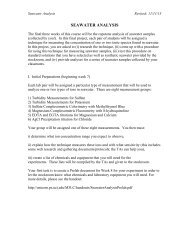HERE - The Corn Group Unicorn Web Site
HERE - The Corn Group Unicorn Web Site
HERE - The Corn Group Unicorn Web Site
You also want an ePaper? Increase the reach of your titles
YUMPU automatically turns print PDFs into web optimized ePapers that Google loves.
Chemistry M3LC Syllabus -- Spring 2013Department of Chemistry, UC-Irvine<strong>Web</strong>site: http://unicorn.ps.uci.edu/M3LCVersion Date: 4.09.13Lectures: Wed and Fri at 11:00a - 11:50a in Rm. PSCB 120.Lecture Instructor:Prof. Robert M. <strong>Corn</strong>Email: rcorn@uci.eduOffice: 2139 Natural Sciences 2Laboratory Instructor:Dr. Kim EdwardsEmail: kdmullen@uci.eduOffice: 580B Rowland HallIntroductionChemical analysis has become a part of everyday life in America. Rarely a day passeswithout an environmental, biochemical or toxicological problem that is defined in termsof chemical composition and measurement. Arsenic contamination of groundwaters inBangladesh, carbon dioxide measurements in the atmosphere, the detection of minuteconcentrations of cancer biomarkers, trace analysis for the identification of weaponsmaterials in airports, the radiochemical analysis of nuclear cleanup sites -- all of thesepolitically potent subjects require the use of chemical analysis to help define the issues.In this course we will learn how to apply the concepts of chemical reactivity and equilibriumfrom Freshman Chemistry in a quantitative fashion to the field of chemical analysis.We will also be introduced to the measurement techniques of optical spectroscopy,electrochemistry and chromatography. Through a series of weekly lectures and laboratoryprojects, we will learn how to design and implement a well-defined chemicalanalysis that conveys the results with full scientific validity and import.Textbook:Fundamentals of Analytical Chemistry, 9th ed.D. A. Skoog, D. M. West and F. J. Holler and S. R. Crouch.Hardcover: 1072 pagesPublisher: Brooks Cole; 9 edition (January 1, 2013)ISBN-10: 0495558281ISBN-13: 978-0495558286<strong>The</strong>re is a 7th and an 8th edition of this book as well. You are welcome to use an earlieredition and save a lot of money! Earlier editions have the same content, but sometimes
the subject order is switched a little bit. I will put a copy of the table of contents of theeighth edition on the class website in the Handouts section.Course Structure:I. Weekly Laboratory ExperimentsDr. Kim Edwards will be in charge of the Laboratory portion of this course. Each weekthere will be a 4-hour Laboratory –the class is broken in to smaller lab sections with LabTAs. <strong>The</strong> following is a schedule of the weekly Laboratory experiments. Please see thewebsite for detailed descriptions of each laboratory.Week 1:Glassware/Safety/Computers/Error AnalysisWeek 2:Quantitative Spectroscopy, Part I: Fe ColorimetryWeek 3:Quantitative Spectroscopy, Part II: Fluorescence SpectroscopyWeek 4:Acids and Bases: Titrations and BuffersWeek 5:Electrochemistry Part I: Measuring Current and VoltageWeek 6:Electrochemistry, Part II: Potentiometry, Potentiometric Titrations, Solubility EquilibriaWeek 7:Complexation Reactions and EDTA TitrationsWeeks 8 & 9:Seawater AnalysisII. Weekly Lectures:Prof. <strong>Corn</strong> will be in charge of the Weekly Lectures for the course. Each week there willbe two 50 minute lecture sessions on Wed and Fri at 11:00p - 11:50p in Rm TBA. <strong>The</strong>sesessions will include instructions from the head TAs on the weekly laboratoryexperiment. <strong>The</strong> purpose of the lectures is (in general) to acquaint you with thestoichiometric and physicochemical underpinnings of chemical analysis, and (morespecifically) to give you concrete examples of the types of calculations you will need toanalyze your laboratory data. Each week Prof. <strong>Corn</strong> will lecture on all subject relevant to
the Laboratory Experiment of the week, and provide examples of the types ofcalculations you will need to analyze your laboratory data. Additionally, any analyticalchemistry subjects incorporated into Chem M3C will also be discussed.III. Weekly Problem Sets and QuizzesEach week there will be a set of problems on Sapling for you to get more practice withthe quantitative analysis calculations. On some weeks (Not necessarily all) there will bequizzes either on-line or in class (to be announced). Some of the material common toChem M3C may show up in that class' exams.IV. Laboratory ReportsYour grade in the laboratory component of this class will be determined primarily byyour laboratory reports. Please see our handout on lab report format and grading policiesthat is posted on the website: http://unicorn.ps.uci.edu/M3LC/handouts/GradingYour grade in this course will have three components:1000 Points – Laboratory (primarily lab reports; please see the lab policies web handout)500 Points – Online Homework and Quizzes(individual quiz points to be announced as they are given)If you score the following percentages of points in the class, you are guaranteed aminimum of the following grades:A+: discretionary A: 90%+ A-: 88-89 B+: 86-87 B: 80-85B-: 78-79 C+: 76-77 C: 70-75 C-: 68-69 D+: 66-67D: 60-65If necessary, we will adjust the final grades so that the average is at least a B-. But it'stypically higher, and there is nothing stopping everyone from getting A's!
Additional Notes and Policies:Laboratory SafetySafety in the Laboratory is our highest priority. Please see our detailed handout on themandatory lab safety rules and procedures in the document posted on the website:http://unicorn.ps.uci.edu/M3LC/handouts/safetyprocedures.pdf.AttendanceAttendance of lab sections is required; attendance of Prof. <strong>Corn</strong>'s lectures are highlyrecommended.E-mailing your Instructor and TAsPlease use common courtesy when sending emails to the TAs or to me. Your emailsshould always include a subject line, student name, and student UCI ID number; and dealwith questions that are directly related to the course material (please check the websitefirst for an answer to your question). Email requests for report deadline extensions willnot be honored, and requests for regrading in order to achieve incremental score increaseswill result in an extremely thorough re-evaluation of the report with no guarantee that thescore will either go up or down. We will do our level best to respond to all relevant emailquestions as soon as possible.CheatingCheating and plagiarism will not be tolerated and will be immediately rewarded with an"F". Please inspect the university policies on academic dishonesty for more details aswell as the specific policies for this course. Examples include: is copying sections of yourlab report from a book, another student's lab report, manuscript, on-line source, etc.Please do not jeopardize your future careers by being irresponsible. For moreinformation, please see the lab report policies handout and for the University rules:http://www.editor.uci.edu/catalogue/appx/appx.2.htmAdds/Drops/ChangesUse <strong>Web</strong>Reg to add or drop your classes. Additions: Students may not add to 151L afterthe first lab has passed. Drops: <strong>The</strong> deadline to drop courses in the Department ofChemistry is the end of Week 2 by 5:00PM. Drops can be made in <strong>Web</strong>Reg. For allenrollment questions, please see the staff in the Chemistry Undergraduate Office in NS21101.



